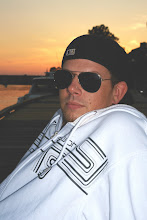
Rap mogul sent threats to prison, inmate says
Former singer says warnings from Marion 'Suge' Knight prompted him to recant testimony in Biggie Smalls' slaying.
A state prison inmate who once implicated a Los Angeles police officer in the slaying of rap star Biggie Smalls testified Thursday that he recanted the allegation because of threats he received from a rival rap producer that were passed to him by a former Los Angeles Times reporter.
Waymond "Suave" Anderson, a former R&B singer, said reporter Chuck Philips passed him several written messages wrapped in plastic at Corcoran State Prison on behalf of rap mogul Marion "Suge" Knight. He said the threats led him to give false testimony at a deposition last year in a civil lawsuit brought by the family of the slain rapper, whose real name was Christopher Wallace.
Anderson is a convicted murderer whose credibility has been questioned by prosecutors. The 43-year-old inmate made the claim over the last two days in a hearing examining evidence that he contends shows he is innocent of a 1993 murder. He is serving a life sentence without the possibility of parole.
Philips, in a telephone interview, denied Anderson's allegation.
"That never happened," said Philips, who has written several stories about Anderson's murder conviction suggesting that Anderson may be innocent. "I'm flabbergasted by this whole thing. This is the ultimate betrayal."
Knight, the founder of Death Row Records, could not be reached for comment.
Anderson and his attorney said the FBI has been investigating the singer's allegations. An FBI spokeswoman declined to comment.
In addition to his testimony about Philips and Knight, Anderson accused police officers, a prosecutor and two of his prior defense attorneys of corruption.
Anderson, who had a nationwide hit in the 1980s with an updated version of the Motown standard "My Girl," was convicted in 1997 of torching a drug users' hangout near USC and setting a man aflame to avenge an unpaid drug debt.
The events leading up to Anderson's murder trial and his attempts to win freedom have all the hallmarks of a legal soap opera.
Before his trial, a judge found him to be mentally incompetent and sent him to Patton State Hospital, a mental facility near San Bernardino. Anderson escaped, allegedly with the help of a hospital employee, but was captured at his sister's house and brought to trial, court records show.
After his conviction, Anderson won a new hearing in 2002 to determine whether his trial attorney was ineffective and to examine evidence that he said showed he was in Mississippi the day the murder took place. Following the hearing, a judge denied his petition for release, finding that Anderson and his supporters had tried to fabricate evidence and "perpetrate an elaborate fraud upon the court."
From behind bars, Anderson became involved in the Wallace family lawsuit, claiming to have information about the slaying. Attorneys for the slain rapper's family contend that a rogue LAPD officer orchestrated the fatal 1997 shooting of Wallace, also known as Notorious B.I.G.
Anderson testified Thursday that he spoke to LAPD homicide detectives about the killing.
He implicated former LAPD Officer David Mack in the slaying.
But last summer, Anderson recanted, telling lawyers representing Wallace's relatives that he had lied and did not know Mack.
At one time, LAPD detectives had investigated Mack in connection with Wallace's slaying.
A theory of one detective was that Mack orchestrated the killing on behalf of Knight, who was feuding with another rap label on the East Coast. Knight and Mack have both denied the allegations and Wallace's murder remains unsolved.
In his own murder case, Anderson and his supporters continued gathering evidence in his bid to prove that he was in Mississippi during the killing. He was granted a new hearing, which began last month in Judge William C. Ryan's downtown courtroom.
In recent weeks, Philips said, he has kept in regular contact with Anderson's family, though he has not been covering the hearing for the newspaper. Over the weekend, Philips said, Anderson's wife set up a conference call with Anderson from jail.
Anderson, he said, asked for his help. Philips said he told him he could do nothing more.
"He just said, 'I'm hung out here all by myself.' I said, 'I don't know what I can do. There's nothing I can do,' " Philips said.
Philips, who left The Times on Friday, has won many awards for his reporting, including a Pulitzer Prize in 1999. But some of his work has also been criticized. Earlier this year, the newspaper retracted one of his stories after it was revealed to have been based partly on fabricated documents.
Outside of court, Anderson's attorney David L. Bernstein said FBI agents had informed him in January that they were investigating the allegations and provided him with copies of the alleged notes. He said they included veiled threats that suggested someone was keeping watch on Anderson's family.





No comments:
Post a Comment